 Five years ago next Wednesday, on a day of horror and infamy, four bombs exploded on London’s public transport system, part of a series of coordinated suicide attacks. Some 52 innocent people were murdered, and hundreds more maimed or injured.
Five years ago next Wednesday, on a day of horror and infamy, four bombs exploded on London’s public transport system, part of a series of coordinated suicide attacks. Some 52 innocent people were murdered, and hundreds more maimed or injured.
For weeks afterwards Londoners lived in fear, and rightly so. Two weeks later, four more bombs were detonated. Mercifully, this time none of the main explosive devices went off.
At this stage, it looked very much as though bombings might become a regular feature of British urban life, just as at the height of the war against the IRA in the Eighties.
Murtaza Shibli’s fascinating book of short essays by Muslims on their response to the 7/7 atrocities helps to explain why that has not come about.
Some might argue that focusing on Muslims is a myopic and self-indulgent response to an attack where the great majority of the victims were not Muslim. But Shibli makes the powerful if controversial case that Muslims, too, were the long-term victims of the 7/7 atrocities.
Society turned against them. Completely innocent people found themselves being blamed for a crime that they had not committed. Muslims were traduced, spat at and physically attacked.
Police stopped them in the street as terrorist suspects. Yaser Iqbal, a Birmingham barrister, recalls: “I can still vividly recall the menace and hatred in the eyes of almost every white face that stared at me on that day – and they all stared.” The atmosphere became so tense that one contributor to this volume came close to emigrating.
Peter Oborne reviews the new book 7/7 Muslim Perspectives in the Daily Mail, 7 July 2010
